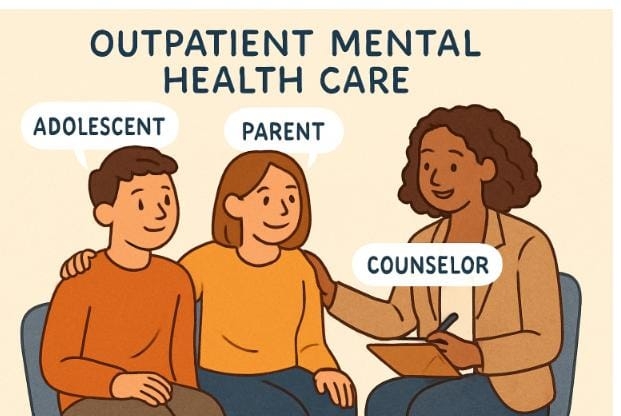Key Takeaways
-
Comprehensive outpatient mental health services offer flexible, supportive options for adolescents and their families.
-
Early access to professional support can help prevent long-term mental health issues.
-
Family involvement is a vital element in adolescent recovery and well-being.
-
Evidence-based therapies and personalized care plans drive successful outcomes.
-
Read more about adolescent mental health challenges from the Child Mind Institute.
-
Community-based resources and ongoing support systems play a crucial role in sustained recovery.
-
Discover how building mental health networks benefits teens in CDC Children’s Mental Health.
The Rising Demand for Adolescent Mental Health Support
Rates of adolescent mental health challenges are surging, underscoring the urgent need for accessible and effective care solutions. From academic stress to social pressures and the unique challenges of growing up in a hyperconnected world, today’s teens are facing unprecedented mental health hurdles. According to the Child Mind Institute, an increasing number of adolescents are experiencing anxiety, depression, and behavioral issues that require timely intervention.
Despite increasing awareness, stigma continues to hinder some families from seeking help. Fortunately, organizations like New Harbor Behavioral Healthcare provide comprehensive outpatient options that empower adolescents and families to access support in non-judgmental, flexible settings. By prioritizing personalized care, these services ensure that teens receive the correct therapeutic tools and encouragement to navigate life’s complex challenges while staying connected to school and family.
As mental health becomes a more openly discussed subject, more families are looking for options that fit into their busy lives without significant disruptions. Outpatient mental health services deliver this much-needed flexibility, helping teens maintain a sense of normalcy and structure—key factors in their successful recovery and well-being. By creating an environment that cultivates healing alongside daily routines, these programs lower barriers to entry and ensure adolescents stay connected to supportive networks.
Access to early intervention through outpatient programs is a critical strategy in preventing mild mental health concerns from evolving into long-term, chronic conditions. The American Academy of Child and Adolescent Psychiatry emphasizes that proactively addressing mental health issues leads to better outcomes, not just for teens but also for their families and communities.
Why Outpatient Services Matter for Teens
Outpatient mental health services are designed to provide treatment while allowing adolescents to remain at home and continue their regular school and family life. This approach offers continuity and structure, essential for teens overwhelmed by more intensive, residential treatment options. Through regular appointments tailored to each individual’s unique needs, outpatient programs offer a bridge between clinical support and daily real-world challenges teens face.
These programs help teens address core issues in a familiar context by engaging them in ongoing counseling and skills—building sessions. This leads to faster progress, improved self-esteem, and a greater sense of autonomy. Parents and guardians can also participate, ensuring the entire family moves forward in healing.

Key Components of a Comprehensive Approach
A truly comprehensive outpatient program recognizes that no two adolescents are alike. Individualized care begins with a thorough assessment, then brings together multiple evidence-based elements such as:
-
Therapeutic counseling—including individual, group, and family sessions
-
Medication management when clinically indicated
-
Education around coping skills and emotional regulation
-
Support for academic achievement and social development
-
Ongoing evaluation to monitor progress and adapt goals as needed
Integrating these components ensures each teen’s treatment evolves to meet their changing developmental needs, providing a tailored roadmap for progress.
The Role of Families in Adolescent Recovery
Family involvement is critical in adolescent mental health recovery. Research highlighted by the National Alliance on Mental Illness shows that family engagement boosts treatment outcomes and helps teens integrate coping skills into their daily lives. When families participate in therapy and adopt new communication strategies, they reinforce the healthy changes initiated in treatment, creating a home environment that nurtures resilience and growth.
Personalized Plans: Setting Goals That Matter
Each adolescent’s mental health journey is highly individual. Outpatient programs start with collaborative goal setting—helping teens and their families identify priorities and milestones. Progress is regularly measured and discussed, ensuring that care remains relevant and teens feel empowered and accountable. For instance, a young person dealing with school avoidance due to social anxiety might work towards gradually increasing their class attendance, using therapeutic tools to build confidence and resilience along the way.
Evidence-Based Interventions That Make a Difference
Evidence-based treatment is the gold standard in teen mental health. Successful outpatient programs commonly utilize Cognitive Behavioral Therapy (CBT), Dialectical Behavioral Therapy (DBT), and Mindfulness-Based Stress Reduction (MBSR). These modalities have strong scientific backing and are proven to reduce symptoms, increase coping skills, and enhance the quality of life for adolescents and their families. Ongoing staff training and outcome monitoring ensure that the most current best practices are constantly used.
Community Resources and Ongoing Support
Recovery doesn’t end with treatment; it relies on a continuum of care supported by community resources. School counselors, peer support networks, and local mental health organizations all provide safety nets for at-risk teens. As featured in CDC Children’s Mental Health, strong community-based systems are key to sustained mental wellness, offering workshops, support groups, and referrals that complement formal outpatient care.
Removing Stigma and Building Sustainable Habits
Addressing the stigma around mental health is one of the most significant ongoing challenges. Outpatient mental health programs often provide psychoeducation, open discussions, and stigma-reduction activities for teens and their families. By normalizing conversations and teaching practical strategies—like mindful breathing, healthy communication, and boundary setting—these services help adolescents build sustainable habits that lay the groundwork for lifelong mental health.
Conclusion
Outpatient mental health services offer a vital, flexible lifeline for adolescents and their families. This approach provides accessible, comprehensive care that fits into daily life, helping teens develop crucial coping skills and emotional resilience. Ultimately, it strengthens family communication and support systems, creating a healthier, more stable environment for everyone to thrive.
Media Contact
Company Name: New Harbor
Contact Person: James Smith
Email:Send Email
City: New York
Country: United States
Website: https://newharborbh.com/
